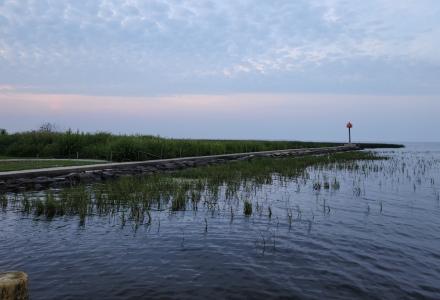
Climate experts and IJC board members are working to assess the impacts of future flooding in the Lake Champlain-Richelieu River (LCRR) basin.
About 30 climate experts and members of the International Lake Champlain-Richelieu River Study Board met in March in Montreal, Quebec, for a climate risk workshop at offices of the Ouranos climate change consortium.
They found a wide range of uncertainty about what future climate may look like in the basin and that the board should consider several approaches to refine adaptive management recommendations down the line.
The study board is tasked with exploring the causes, impacts, risks and solutions to flooding in the basin, such as the heavy floods seen in 2011. Once completed, the board is to provide its study conclusions and recommendations to the IJC on how to best mitigate and monitor flood risks.
People and governments in the basin are looking to the board to help determine if flooding will be more or less of a problem looking ahead due to climate change. The IJC has been working on this problem in other basins through its climate change framework, which can help boards develop guidance in the face of the uncertainty about what future climate conditions may bring.

Workshop attendees found a wide range of different climate outcomes in the LCRR basin depending on the method used to look at future scenarios.
For example, a trend analysis of historic flooding incidents provides no clear indication on whether flooding would become more or less likely going forward, while a computer projection based on combining multiple climate models suggests the basin could see water levels decline, but with enough variability that major floods could still occur. This set of unknowns is called the range of uncertainty.
According to the US Fourth National Climate Assessment, the northeast United States is expected to see an increase in winter and spring precipitation, which, coupled with warming temperatures and more water vapor able to be stored in the atmosphere, could lead to more extreme precipitation events.
The next step, attendees agreed, should be to perform stress tests on the LCRR system to see how damages change under different flooding conditions, then test alternative flood mitigation strategies against a variety of possible future flooding scenarios. This would identify potential failure points in the basin, as well as the most likely scenarios to watch for where failures occur. This is along the lines of what the IJC has already put together as part of its climate change framework stress test methodology, which was done in the St. Croix River basin last year.
According to a workshop presentation by Alec Bernstein of the University of Massachusetts, this approach is valuable. When dealing with rare, extreme events, stress tests can examine potential conditions that existing and planned flood mitigation measures would face and how well they may respond

A few ways to develop fresh flooding scenarios were discussed at the workshop. The first involves computing the “probable maximum flood.” This is done by taking the three primary phenomena behind flooding – overwinter snowpack, the spring temperature regime and spring precipitation – and combining the worst scenario from each one to produce a truly worst-case maximum flood stage.
A second method would create a synthetic dataset by manipulating the historical record to produce more severe floods and droughts, called “bootstrapping.” A third approach is called “stochastic hydrology simulation,” and involves developing thousands of years of water inflow datasets that follow the same basic averages of the historical record, but include more severe floods and droughts.
Workshop attendees concluded that the LCRR study board should review existing climate science in the basin to determine which parameters should be monitored in the long-term to get a sense of how the climate is changing over time.
“We heard nothing but high praise for the workshop,” said Bill Werick, an organizer. “There was a sense that the presentations given provided a wide array of expert perspectives and were focused on the pertinent question, which was not how climate is changing, but how the board should consider climate change in making its recommendations.”
More than a dozen tasks were identified at the workshop and presented to the study board at its April 16-17 meeting in Burlington, Vermont. The information obtained from the workshop will be used to further develop the study’s Climate Change Strategic Plan and modify and realign work plans accordingly.
Additionally, the IJC’s International Souris River Study Board sent a representative to bring back information relevant to its work to investigate flood mitigation and adaptation in the Souris basin. That study is looking at the operations of four reservoirs and other measures to make flood control and water supply storage recommendations to the Canadian and US governments.
A Climate Advisory Group has been established by the Souris study board, according to Chanel Mueller, a group member.
Mueller said the workshop was an opportunity to establish collaborative relationships and share potential strategies, including techniques used to analyze and communicate climate change impacts.
“By using opportunities like the LCRR climate risk workshop to share strategies and resources for analysis, the Souris River study, along with the LCRR study, will benefit from access to shared resources, and will help to ensure that various IJC boards take a consistent and state-of-the-art approach to analyzing climate change impacts, and that the analysis being adopted follows the IJC’s (climate change guidance framework),” she said.

Kevin Bunch is a writer-communications specialist at the IJC’s US Section office in Washington, D.C.



